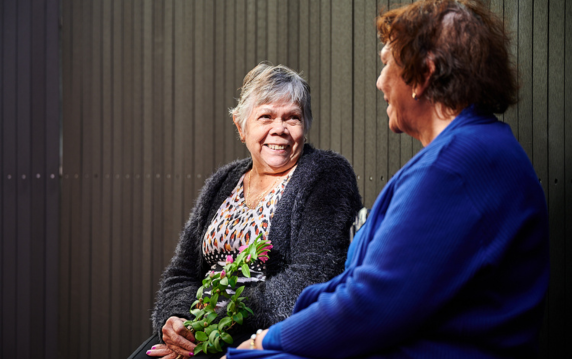We are taking on an enhanced role in supporting the health and wellbeing of older Australians.

As part of the Aged Care Program, we are designing, commissioning, and delivering activities to support access to primary care and aged care services for older Australians.
Many older Australians are now living longer and healthier lives, however there are many who lack appropriate access to primary care, opportunities for social interaction and economic engagement within their communities.
Funding under the Australian Government Aged Care Reform Package to Primary Health Networks (PHNs) is focused on initiatives with the overarching goal of delaying entry into residential aged care homes (RACHs) and reducing avoidable hospitalisations for older Australians.
The Final Report: Royal Commission into Aged Care Quality and Safety identified several areas that affect aged care residents and our health system, including limited access to GPs and allied health professionals in RACHs, difficulties accessing out of hours services and unnecessary hospital transfers.
To help us understand community needs, aged care system capacities and areas for investment, stakeholder consultations were undertaken throughout 2022. We will continue to build relationships and hear from the WA aged care sector, GPs through the care of the older person specialist interest panel, community members and state government departments.
The Australian Government has provided aged care and dementia activity funding guidance to support us to design, commission and deliver the following activities.
Click below to read more
Greater Choices for At Home Palliative Care aims to improve access to safe, quality palliative care at home and support end-of-life care systems and services in primary health care and community care. Enabling the right care, at the right time and in the right place to reduce unnecessary hospitalisations for older Australians.
At the heart of this program being implemented by WA Primary Health Alliance (WAPHA) are three main goals:
- To promote choice about what matters most to people who are approaching the end of their lives by improving awareness of advance care planning and palliative care.
- To develop a model of care which acknowledges the work of GPs in the care of people at the end of their life. We will aim to support GPs to identify potential unmet palliative needs of people with complex chronic conditions early and provide a planned approach to care
- To collaborate with community-based organisations representing Aboriginal, regional community and underserved populations to ensure all members of our WA community have appropriate access to advance care planning and palliative care
The Australian Government has provided funding to WAPHA to support RACHs with training and equipment to deliver telehealth consultations for residents.
This initiative:
- Provides timely access to specialist telehealth for older people receiving care in RACHs.
- Equip RACHs with the necessary equipment and training for staff to support telehealth services.
- Encourage a GP-led model of care.
Who does this initiative support?
- RACHs to have access to adequate telehealth to support access to virtual consultations with GPs and other health professionals.
- People who are residents in RACHs to have improved access to telehealth consultations as appropriate to their needs.
Access the after-hours toolkit for residential aged care homes
WAPHA is supporting RACHs to guide and implement after-hours plans and to educate staff on appropriate health care planning for residents who require after-hours care.
WAPHA is engaging with RACHs and primary care to achieve the following objectives:
- Provide guidance to assist participating RACHs to have appropriate after-hours plans in place.
- Educate participating RACH staff on the after-hours health care options and processes for residents.
- Encourage participating RACHs to implement procedures for keeping residents’ digital medical records up to date, particularly following an episode where after-hours care was required.
- Support engagement between RACHs and their residents’ GPs (and other relevant health professionals), as part of after-hours action plan development.
Who does this initiative support?
- RACH residents can experience deterioration in their health during the after-hours period, but immediate transfer to hospital may not always be clinically necessary.
- Lack of awareness and utilisation of out of hours services provided by GPs and other health professionals may lead to unnecessary hospital presentations.
Some older Australians are entering aged care earlier than they may otherwise need to due to a lack of support for healthy ageing or ability to manage their chronic conditions in the community. WAPHA will commission of early intervention services and models for chronic conditions management that support healthy ageing and reduce avoidable hospital admissions.
Improving health outcomes for older Australian’s (particularly those at risk of poor outcomes) through early intervention programs will be guided by the following objectives:
- Expand existing healthy ageing programs where relevant.
- Support older Australians to live in the community for longer (including those not currently receiving aged care services) through commissioning early intervention initiatives that promote healthy ageing, slow decline, and support the ongoing management of chronic conditions.
- Increase awareness in the primary health care workforce of the needs of the population and the availability of these initiatives.
Who does this initiative support?
This measure will seek to support older adults (65 years and over for non-Aboriginal people and 50 years plus for Aboriginal people) who are living in the community with one or more diagnosed chronic conditions and would benefit from being better connected to psychosocial, health and welfare supports.
WAPHA has commissioned care finder service organisations to form part of the national network of care finders who will support improved integration between the health, aged care and other systems at the local level. Visit My Aged Care’s help from a care finder webpage to find a provider in your region.
WAPHA works to increase the awareness, engagement, and utilisation of aged care clinical referral pathways by local health care practitioners (including GPs, allied health and practice staff) and engage local clinical practitioners, and experts in their development.
We review currents pathways, identify gaps and renew clinical referral pathway topics, health services and assessments for inclusion in localised clinical pathway guidance fit for the care of older Australians.
Who does this initiative support?
The WAPHA clinical referral pathways (Clinician Assist) are designed to be used at the point of care, primarily by GPs but is also available to hospital specialists, nurses, and other health professionals.
In February 2022, WAPHA received guidance on dementia clinical referral pathways. Dementia specific clinical referral pathways have been updated.
Who does this initiative support?
The WAPHA dementia clinical referral pathways (Clinician Assist) are designed to be used at the point of care, primarily by GPs but is also available to hospital specialists, nurses, and other health professionals.
WAPHA is engaging with participating RACHs to establish and fund a dedicated clinical coordinator role within RACHs to liaise with GPs, co-ordinate case conferencing and engage GPs in RACH quality improvement.
The intended outcomes of the project will be to:
- Improve resident and family/carer access to primary care and quality end-of-life and palliative care.
- Improve coordination of primary care in RACHs.
- Manage residents’ end-of-life and palliative care health needs to include access to timely and appropriate medication.
- Implement systems and processes to support the sustainable delivery of primary care coordination for general practice and RACHs.
This activity has been made possible through the WA Department of Health NPA Grant. A summary of the 2021 GP consultation key themes: current interaction with palliative care, case conferencing, additional GP support and funding recommendations that informed the project is available here.
To better support older Australians living in residential aged care to receive continuous, quality primary care services from a regular general practice and GP, the MyMedicare General Practice in Aged Care Incentive has commenced.
Eligible providers and practices registered with MyMedicare are able to receive quarterly incentive payments for meeting the General Practice in Aged Care Incentive eligibility and servicing requirements.
Find out more:
We will improve outcomes for older Australians in WA by:
- Commissioning services for older people which address identified needs and gaps in our PHNs’ local primary health and aged care systems.
- Enhancing access to general practitioners and other primary care providers.
- Improving coordination, integration and continuity of care that contributes to improvements in the health and wellbeing of older people and promotes healthy ageing in place.
- Supporting access to aged care services and other relevant supports in the community and building the capacity of health and aged care professionals to deliver high quality care.

Links and resources:
- Breakfast plate of healthy ageing
- An Age-Friendly WA – State Seniors Strategy 2023-2033
- My Aged Care
- Australian Government Aged care reforms
- Supporting Healthy Ageing: The Role of PHNs
- Australian Government Ageing and Aged Care Engagement Hub
- Volunteering in aged care – Australian Government Department of Health, Disability and Ageing
Education:
- Ageism Online Learning Module
- Recognising, Responding and Reporting the Abuse of Older People
- Medication Management E-Learning
- The Australian Immunisation Register
- Watch on demand: Accessing the Australian Immunisation Register and My Health Record in Aged Care
- Watch on demand: Immunisation in Aged Care and the General Practice Aged Care Incentive
